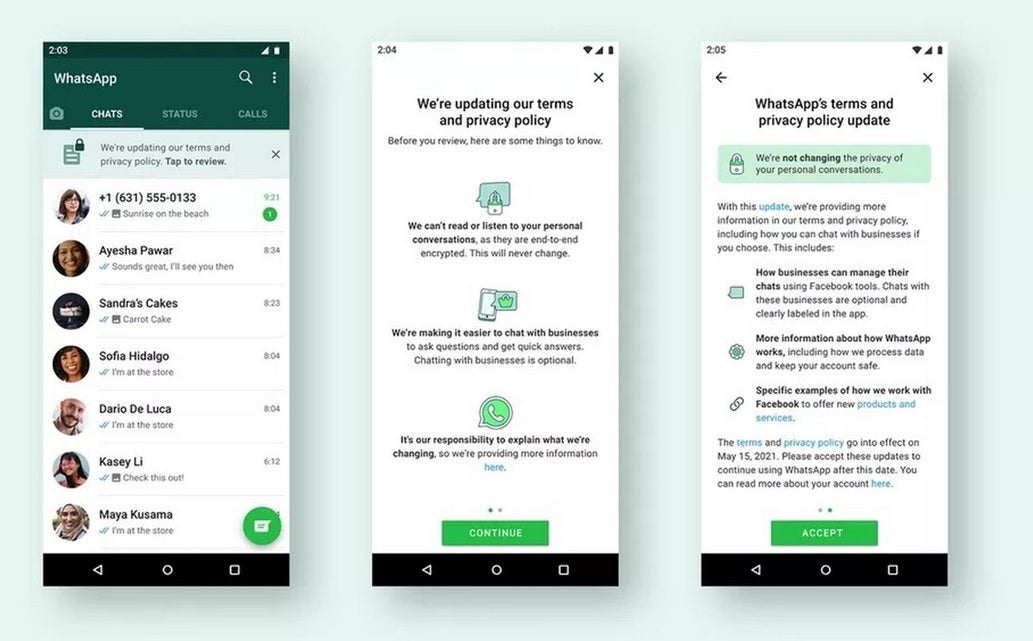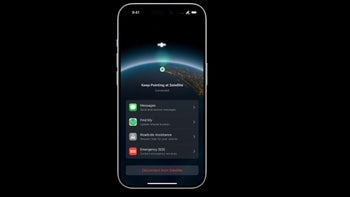Here's what WhatsApp users face if they don't opt-in to the new Privacy Policy by May 15th

WhatsApp is not planning on making any changes to its new Privacy Policy and users must opt-in to the update by May 15th. In an email from WhatsApp to one of its merchant partners that was seen by TechCrunch, WhatsApp will "slowly ask" users to agree to its new terms. Those who do not comply with the new terms will lose full functionality of WhatsApp starting on May 15th. Those subscribers not agreeing to the new policy by that date will face a punishment. In its newly posted FAQ page, WhatsApp says, "To give you enough time to review changes at your own pace and convenience, we’ve extended the effective date to May 15th. If you haven’t accepted by then, WhatsApp will not delete your account. However, you won't have full functionality of WhatsApp until you accept. For a short time, you'll be able to receive calls and notifications, but won't be able to read or send messages from the app. By "a short time," WhatsApp means "for a few weeks."

WhatsApp will post more information about its new privacy policy as it gets closer to the May 15th deadline
After May 15th, you can still accept the updates although WhatsApps rules regarding inactive users will apply. Those rules say that after 120 days of inactivity, accounts are usually deleted. And if you do decide to delete your WhatsApp account, there is a price to pay. The WhatsApp Help Center says, "If you’d like to delete your account on Android, iPhone, or KaiOS, we hope you reconsider. It is something we cannot reverse as it erases your message history, removes you from all of your WhatsApp groups, and deletes your WhatsApp backups."
So what is this whole thing about? WhatsApp has been forced to update its privacy policy after deciding that it will allow users to directly message businesses on its platform. The problem is that there is a grave misunderstanding with some subscribers believing that by agreeing to the new Privacy Policy update, WhatsApp users will be sharing their personal data with Facebook. But this is not true and private messages will remain encrypted from end-to-end. This won't be the case for messages sent to businesses over WhatsApp. Data used in business messages can be used for ad targeting with some data kept on Facebook's servers.
WhatsApp once described end-to-end encryption in this way: "Strong encryption acts like an unbreakable digital lock that keeps the information you send over WhatsApp secure, helping protect you from hackers and criminals. Messages are only kept on your phone, and no one in between can read your messages or listen to your calls, not even us. Your private conversations stay between you."
The misplaced belief that Facebook was getting to see encrypted messages between WhatsApp users led a number of subscribers to make the decision to leave WhatsApp for rival messaging apps like Signal and Telegram. But had users understood that their personal messages remain encrypted, the rush for the exits would not have happened. Talking about the confusion and the mistaken beliefs about Facebook, a WhatsApp spokesman said, "We’ve heard from so many people how much confusion there is around our recent update. There’s been a lot of misinformation causing concern and we want to help everyone understand our principles and the facts." So in the weeks leading up to the May 15th deadline, WhatsApp is going to post an in-app banner that will allow users to re-read about the new privacy update so that they will accept the changes allowing them to continue using the app. An image of that banner accompanies this article.
The new privacy policy will allow WhatsApp and Facebook to share payment and transaction data to target ads better. For the last five years, WhatsApp has shared user phone numbers and device information with Facebook. The latter bought WhatsApp for a final price north of $19 billion in February 2014. WhatsApp has over 2 billion users in over 180 countries.










Things that are NOT allowed: